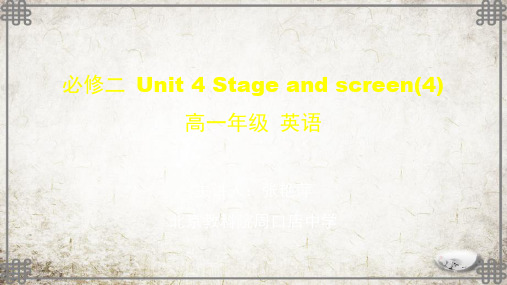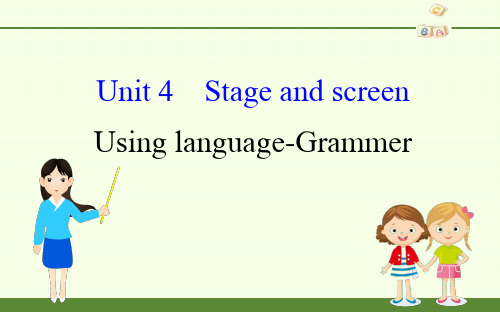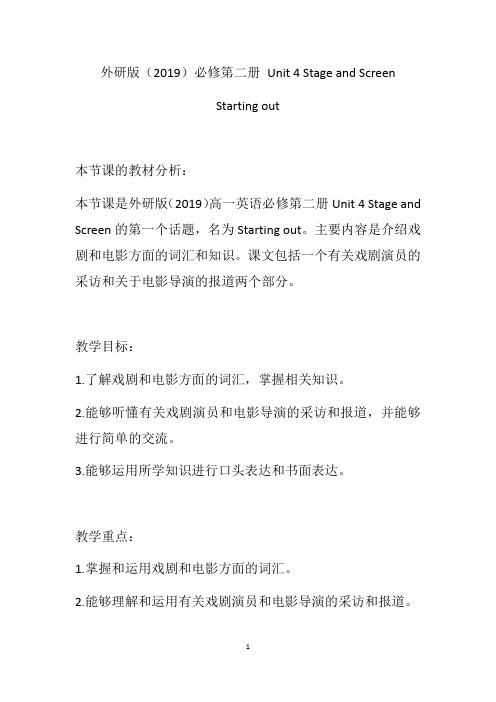高中英语 Unit 4 Stage and screen泛读 技能初养成教案 外研版必修第二
外研版()必修第二册Unit 4Stage and screen(解析版)

必修第二册Unit 4Stage and screen佳作抢鲜背学写作思路,背精彩范文(求助信——指导改编短剧)(全国Ⅲ卷)假定你是李华,你和同学根据英语课文改编了一个短剧。
给外教Miss Evans写封邮件,请她帮忙指导。
邮件内容包括:1.剧情简介;2.指导内容;3.商定时间地点。
精彩范文Dear Miss Evans,I’m writing to ask for your help with our English short play adapted from our English textbook.The story starts with a boy named Huckleberry Finn,who ran away from home and lived with his friend Jim,a former slave,on a raft on the Mississippi River.Then Finn was cheated by two men,with his raft stolen and Jim sold to a farm. Finn and his friend Tom Sawyer made a plan to save Jim from the farm.At last they managed to free Jim.I wonder if you would like to give us some advice.The vocabulary and grammar of the plot need to be adjusted,and we also need your guidance on our performance.If possible,shall we meet you in your office at 10 am tomorrow? Looking forward to your early reply.Best regards!Yours truly,Li Hua迁移运用每日句型练透:with复合结构1.He stood before his teacher with his head down.他低着头站在老师面前。
Unit 4 Stage and screen Period 2教学设计

2021学年度外研版新教材必修二Unit 4 Stage and screen Period 2 Using language教学设计本单元的主题语境是“人与社会”——影视、戏剧艺术。
本板块包括语法部分-ing as adverbial、词汇部分Types of TV programme和听说部分Watching a performance。
语法部分在本单元的主题语境下进行学习,掌握现在分词作状语的形式;词汇部分六个小段落用生动的描述介绍了六种电视节目类型;听说部分包含一篇关于“Glastonbury音乐艺术节”的简介以及对话形式的听力材料,听力材料内容涉及观看音乐节的一系列事项安排,如出行方式、食宿等。
1. Master the basic form of adverbial adverbial of present participle and can use it flexibly in the context of the theme;2. Master the vocabulary to describe the types and characteristics of TV programs, and can talk about their favorite TV programs;3. Understand the listening content, obtain information and complete relevant exercises;4. Imitate the listening material and use relevant expressions to start a dialogue about making travel plans;5. Read words that should be stressed or weak in a sentence.Key points:1. Master the form of present participle as adverbial, and can use it skillfully;2. Master the expressions of travel arrangements through listening materials.Difficult points:Use the present participle as adverbial structure accurately and skillfully;Express travel arrangements accurately.1. Preview the content of this section, understand new words according to the context or consult the dictionary;2.Read the paragraphs that describe six TV programs and underline the words that describe the programs.Step 1 RevisionRead the text on page 38-39 quickly and underline the sentences with v-ing.1.Having seen quite a few productions of Hamlet and read the play many times, I was full of confidence - until the Peking Opera came to town!2.Dating back to the 18th century, Peking Opera has over two hundred years of history.3.Starting with an orchestra playing traditional Chinese instruments, the opera brought a completely new sound to my Western ears.ing such techniques, the opera had transformed a small stage into the whole universe.5.Feeling the strong emotions of love, anger, fear and grief in the performance, I could easily recognise the theme of Hamlet.T asks Ss to understand these sentences better, think of the function of v-ing in each sentence.Step 2 Learning new grammarActivity 11.1. T asks Ss to read sentences (a) and (b) in Activity 1 and answer questions 1 and2.Answers:①I.②I.2. T asks Ss to read sentences (c) and (d) in Activity 1 and answer questions 3 and 4.③What is the difference between the two groups of sentences?④Why does the author choose to use sentences (a) and (b) in the reading passage?Answers:③The first group uses present participles as adverbial while the second group uses adverbial clauses.④The sentences from the reading passage are more concise and formal.3.T asks Ss to read the other sentences in revision part and think of their functions.Activity 21.T asks Ss to complete the journal entry in Activity2.2.Ss complete the journal entry with the correct form of the verbs in brackets.3.Check their answers with class.Answers: 1.Seeing2.felt 3.making 4.to practise 5.Feeling 6.knowingStep 3 PracticeActivity 31. T asks Ss to rewrite the paragraph using the -ing form in Activity 3.2. Ss rewrite the paragraph using the-ing form in Activity3.3. Check the answers with class.Answers:I went to watch the ballet The Peony Pavilion last night. Having thought ballet was more or less the same everywhere, I was totally unprepared for its unique beauty. As soon as the curtain rose, I was absorbed. Borrowing a lot from Chinese dance and music, the Eastern influence on the ballet was clear. The production was full of colours and romantic symbols, challenging my senses in new ways. Enjoying it so much, I have changed my opinion about ballet. I can't wait to go again!Step 4 Reading and answeringActivity 41. T asks Ss to look at the pictures and answer the questions.①What do you know about these types of TV programme?②Can you think of some examples of each type?2. Ss talk about what they know about these types of TV programme.Activity 51. T asks Ss to read the descriptions in Activity 5, match them to the types of TV programme in Activity 4, and underline the words and expressions describing them.2. Check the answers with class.(1-c, 2-e, 3-d, 4-a, 5-b, 6-f)Step 5 PracticeActivity 61.T asks Ss to talk about their favourite TV programme using the words and expressions they have learnt.2.T asks Ss to read the short passage in “Did You Know?” to get some basic information about Glastonbury Festival.Step 6 ListeningActivity 71. T plays the recording for the first time and asks Ss to finish Activity 7.2. Ss listen for the first time to get some key information about the arrangements.Activity 81. 1. T plays the recording again for Ss to complete the flyer in Activity 8.2. T asks Ss to talk about how Josh makes arrangements by referring to the memo and the flyer.3. T asks Ss to summarise basic elements involved when making arrangements.Step 7 SpeakingActivity 91. T asks Ss to listen to the interview and choose the points mentioned.2. T asks Ss to listen again and complete the journalist’s notes.3. T asks Ss to listen for the third time and talks about the explanations Leah gives for doing Tai Chi.4. Listen again and then check answers with class.Step 8 Homework1)T asks Ss to make similar arrangements to attend a concert in another city.2)Remember the functions of v-ing.3)Complete the exercises in learning plan.1.通过本节内容学习,学生能否掌握现在分词的功能和用法;2.通过本节内容学习,学生能否掌握描述电视节目类型以及特点的词汇,能否谈论自己喜爱的电视节目。
高一英语(外研版)-必修二 Unit Stage and screen (4)- PPT课件

Lead-in
primarily concerns the young and mysterious millionaire Jay Gatsby and his passion for the beautiful Daisy. As the narrative progresses, it shows Gatsby’s rise from humble origins to immerse wealth, all in a quest to win back Daisy, his first love.
Careful-reading
What’s the function of the example?
Harry Potter: to support the idea that some parts of the story and some characters are missing in the movie.
Careful-reading
One of the key reasons behind this is that while a book usually takes a few days to read, a movie typically lasts under two hours. This means that great books can lose plot details and characters when they move to the big screen. This is something that even the highly successful Harry Potter movies can’t escape from, with fans of the books disappointed not to see some of their favourite characters in the movie versions.
高一英语(外研版)-必修二 Unit 4 Stage and screen (2) -1教学设计

1.掌握现在分词作状语的基本形式;
2.在语境下灵活使用-ing作状语;
教学重点
掌握现在分词作状语的用法
教学难点
准确熟练地使用现在分词作状语的结构
教学策略
任务型教学法
Teaching content
Procedure
Purpose
Teacher’s activity
Students’activity
Use inquiry-based learningtofind the rules of-ingused as adverbial.
Structure and usage
1.T guides Ss to analyze how to paraphrase the sentences .What kind of adverbial they they are.
2. Figure out the difference between doing and having done
3.Make sentences using -“ing”as adverbial
To find the rules of-ingused as adverbial step by step.
Toconfirm Ss have grasped the usage of -ing as adverbial
Homework
1.T asks the Ss to review the reading passage and find out and pay more attention to all the -ing form used as adverbial
2.T asks Ss to compare doing and having done to find the difference.
外研社英语高一必修2《Unit 4 Stage and screen》 课件

(3) __A_r_r_iv_i_n_g_a_t__th_e__h_o_t_el, she found them busy laying tables. 到了旅馆, 她发现他们正忙着摆桌子。
三、现在分词的时态、语态 1. 现在分词的时态 现在分词作状语时, 要注意分词的时态, 是用现在分词 的一般式(doing), 还是用完成式(having done)。 (1)当现在分词的动作与谓语动词的动作同时发生时, 用分词的一般式。
【知识延伸】 动词-ing形式的否定形式: not+doing与not having+done *Not knowing this, he didn’t come. 他不知道这件事, 所以没来。 *Not having made full preparations, we put off the sports meeting. 因为没有做好充分的准备, 我们把运动会延期了。
3. 作条件状语 一般放在句首, 其前可以加if, unless等连词 (1)Turning left, you will find a path. =If you turn left, you will find a path. 左拐, 你会找到一条路的。
4. 作结果状语 现在分词作结果状语时, 通常放在句末, 中间用逗号隔 开, 表示一种顺其自然、意料之中的结果。 (1)(2019·全国卷Ⅰ) If you exercise out of doors, your body will learn to breathe more deeply, allowing even more oxygen to get to your muscles and your brain. 如果你在户外锻炼, 你的身体就会学会深呼吸, 允许更 多的氧气到达你的肌肉和你的大脑。
外研版高中英语学案必修第二册 Unit 4 Stage and screen Section C

2.storytelling n.
讲故事,说书
3.wonderland n.
(故事中的)仙境,奇境
4.epic adj. 史诗般的;壮丽的,宏大的
串记拓展词汇
1.brief adj.短暂的→ briefly adv.短暂地 2.cinematic adj.电影的→ cinema n.电影院 3.disappointed adj.失望的,沮丧的→ disappointing adj.令人失望的 → disappoint v.使失望→ disappointment n.失望;令人失望的人或事 4.original adj.原先的,最初的→ origin n.起源→ originally adv.原 先,最初 5.fictional adj.虚构的,编造的,小说(中)的→ fiction n.小说 6.awkward adj.紧张的;不舒适的→ awkwardly adv.紧张地;不舒适地 7.behave v.表现→ behaviour n.行为
Good movies need good stories.But why has one of the earliest and greatest 2. works (work) in Western storytelling,Homer’s The Odyssey,never had an 3. equally (equal) great movie based on it?Movies need strong characters.So why have the movies based on The Great Gatsby never been praised as “great”?Movies of course need 4. impressive (impress) images. So why has Alice in Wonderland only resulted in movies best described as “interesting”?
Unit4StageandscreenDevelopingideas课件-高一英语外研版必修第二册

Learning to learn
Examples in argumentative essays can be used to: 1. explain ideas and concepts. 2. support arguments. 3. provide additional information.
Match the author’s opinions about the movie adaptations to the examples from the passage. □1 Some parts of the story and some characters are missing in the movie. □ 2 The visual images are not as striking as the descriptions in the book. □ 3 The movie is not as great as the book. □ 4 The movie doesn’t look the way we visualised while reading the book. □ 5 The characters do not stand out.
Does the author put forward something against his original viewpoint in the last paragraph?
There are a thousand Hamlets in a thousand people’s eyes. Furthermore, books and movies are two different forms of media and therefore have different rules. With this in mind, perhaps we should judge a movie in its own right, and not against its original source.
Stage+and+Screen+Starting+out+教学设计 高一英语外研版(2019)必修

外研版(2019)必修第二册Unit 4 Stage and ScreenStarting out本节课的教材分析:本节课是外研版(2019)高一英语必修第二册Unit 4 Stage and Screen的第一个话题,名为Starting out。
主要内容是介绍戏剧和电影方面的词汇和知识。
课文包括一个有关戏剧演员的采访和关于电影导演的报道两个部分。
教学目标:1.了解戏剧和电影方面的词汇,掌握相关知识。
2.能够听懂有关戏剧演员和电影导演的采访和报道,并能够进行简单的交流。
3.能够运用所学知识进行口头表达和书面表达。
教学重点:1.掌握和运用戏剧和电影方面的词汇。
2.能够理解和运用有关戏剧演员和电影导演的采访和报道。
教学难点:1.学生在语言表达方面的能力培养。
2.学生对戏剧和电影方面的词汇和知识的理解能力。
学情分析:学生是高一年级的学生,初次接触到戏剧和电影方面的知识,对相关词汇和概念了解较少。
由于是第一堂课,学生的注意力较为集中,课堂氛围较好。
学生在听力和口头表达方面需要进一步培养。
教学策略:1.激发学生兴趣:通过介绍一些有趣的戏剧和电影知识,激发学生对戏剧和电影的兴趣。
2.提高学习兴趣:利用多媒体技术,播放有关戏剧演员和电影导演的采访和报道的视频,增加学习的趣味性。
3.师生互动:通过师生互动、小组讨论等方式,积极激发学生的思维参与和表达能力。
教学方法:1.听力训练:播放有关戏剧演员和电影导演的采访和报道的录音,要求学生听懂并回答相关问题。
2.问答互动:老师提出问题,鼓励学生进行回答和讨论。
3.小组讨论:将学生分成小组,让他们就相关话题展开讨论,提高学生的口头表达能力。
4.角色扮演:让学生分角色进行戏剧演员和电影导演的对话练习,提高学生的语言运用能力。
总结:通过本节课的教学,学生将会掌握戏剧和电影方面的词汇和知识,提高听力、口语和写作能力。
同时,通过引导学生思考和讨论,培养学生的批判性思维和团队合作能力。
- 1、下载文档前请自行甄别文档内容的完整性,平台不提供额外的编辑、内容补充、找答案等附加服务。
- 2、"仅部分预览"的文档,不可在线预览部分如存在完整性等问题,可反馈申请退款(可完整预览的文档不适用该条件!)。
- 3、如文档侵犯您的权益,请联系客服反馈,我们会尽快为您处理(人工客服工作时间:9:00-18:30)。
Unit 4 Stage and screen阅读教材P44-45中的材料,选出最佳选项1.What does “a picture is worth a thousand words” mean?A.The picture is very expensive.B.There are a thousand words in the picture.C.The picture is hard to describe in wordsD.The picture is rich in contents.2.Why some great works don't have an equally great movie?A.A book usually takes a few days to read.B.Some movies are not what people imagined in the books.C.Books have more imaginary scene.D.Books and movies are two different forms of media.3.What can we infer from this passage?A.Fewer and fewer people would like to read books.B.More and more people like to see films.C.Books that the good movies are based on may not be good.D.Audience are no longer to go to cinema.4.What is the main idea of this passage?A.Books are good,movies are bad.B.Good books aren't necessary for good movies.C.Good books and good movies have different rules.D.Good books have no relation to good movies.[答案]1-4 DDCCWords and Phrases知识要点1absorbed adj.专心致志的(教材P41) As soon as the curtain rose,I was absorbed.幕一拉开,我就全神贯注了。
[例1] The writer was so absorbed in his writing that he forgot everything outside.这个作家全神贯注地进行写作,以至于忘了外面的一切。
[例2] He paused,absorbed by his reflections.他停下来,陷入了沉思。
[造句] 当我进来时,他正聚精会神地在看小说。
When I entered,he was absorbed in reading a novel.①Absorbed(absorb) in painting,John didn't notice evening approaching.②With the children making so much noise outside,I can't get absorbed in my study.③The meeting was absorbing(absorb) right from the beginning.知识要点2put on 表演(节目);穿上,戴上;假装,装出;增加(体重)(教材P42) Each of the contestants put on a wonderful performance—they all really wanted to win!每个参赛者都进行了精彩的表演——他们都很想赢![例1] It's rather cold outside,you had better put on your overcoat.外面相当冷,你最好穿上大衣。
[例2] He was very nervous,but did his best to put on a calm look.他非常紧张,但极力装出平静的样子。
[造句] 我们在音乐会上要是演奏不好,那就太难看了。
It would be a shame if we put on a bad performance at the concert.①Firefighters arrived there and they soon put out the fire.②He did a great deal of exercise so as not to put on weight.③A notice was put up to tell the students the changed lecture time.④To make space in the bedroom,she put away her winter clothes.知识要点3appealing adj.有吸引力的,有趣的(教材P42) Leopards are such appealing creatures.豹子是如此吸引人的动物。
[例1] TV shopping is appealing because you can buy things easily without going out.电视购物很有吸引力,因为你可以不用出门就可以买东西。
[例2] It creates an atmosphere which visitors find so appealing.它营造了一种游客感到很有趣的氛围。
[造句] 这是我去过的最有趣的地方之一。
This is one of the most appealing places I've been to.①If you make an appeal to him for help,he will certainly lend you a hand.②In recent years,our government has been always appealing to everyone to save(save) water.③The advertisement has deeply appealed to me,so I want to apply for the position.知识要点4rude adj.粗鲁的,无礼的(教材P42) What a rude person the host was!主持人真是个粗鲁的人![例1] Please forgive me—I didn't mean to be rude.请原谅我——我不是有意无礼的。
[例2] He told a rather rude joke,making everyone embarrassed.他讲了一个相当粗俗的笑话,使每个人都非常尴尬。
[造句] 我想知道你怎么能这么长时间容忍这么一个粗鲁的人。
I wonder how you can put up with such a rude person for so long a time.①I can't stand you being so rude to an old lady any more.②In the West people think it's rude to stare(stare) at a person.③The customer demanded to see the manager for the assistant's rudeness(rude).知识要点5escape v.(从危险或糟糕的处境中)逃离,逃避,摆脱;(气体、液体等)漏出;被遗忘n.逃跑,逃避(教材P45) This is something that even the highly successful Harry Potter movies can't escape from...……这是即使是非常成功的《哈利·波特》系列电影也无法逃避的现实。
[例1] No detail was too small to escape her attention.任何细节都逃不过她的注意。
[例2] I remembered seeing him somewhere before,but his name escaped me for the moment.我记得以前在某个地方见到过他,但一时想不起他的名字。
[造句] 如果犯法,任何人都逃不过惩罚。
No one can escape punishment if he breaks the law.①Only with the greatest of luck did she manage to escape from the rising flood waters.②The old man had a narrow escape in the battle when he was young.知识要点6disappointed adj.失望的,沮丧的(教材P45) ...with fans of the books disappointed not to see some of their favourite characters in the movie versions.没有看到他们最喜欢的一些角色出现在电影版本中,让这些书的粉丝失望……[例1] They were greatly disappointed at the result of the game.他们对比赛结果极为失望。
[例2] There was a disappointed look on her face when she saw the result.当她看到结果时,脸上露出了失望的神情。
[造句] 他没有通过考试的消息让他感到非常失望。
The news that he failed the exam made him very disappointed.①The workers were disappointed to find(find) that they couldn't understandthe instructions on the machine.②It rained most of the time during the holiday,which was very disappointing(disappoint).③Much to our disappointment,the sports meeting is canceled.[小片段助记]He was disappointed at the disappointing news,so there was a disappointed look on his face.知识要点7live up to符合(标准),不负(盛名)(教材P45) Many people thought she didn't live up to Helen's title of “the most beautiful woman in the world”,influencing opinions of the movie to some extent.很多人认为她不符合海伦“世界上最美丽的女人”的称号,这在一定程度上影响了人们对电影的评价。
